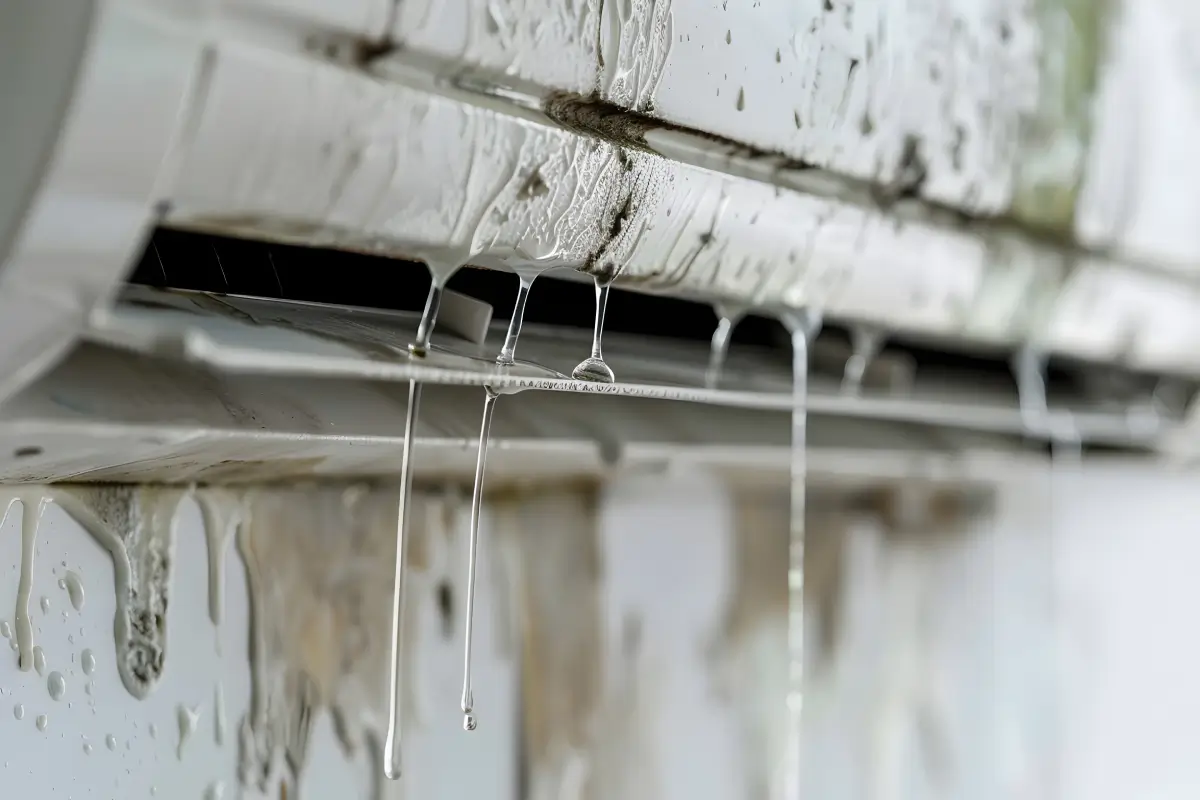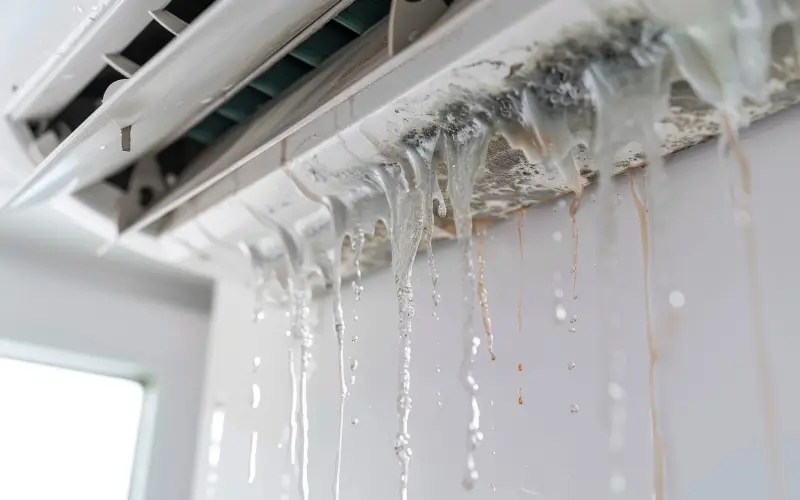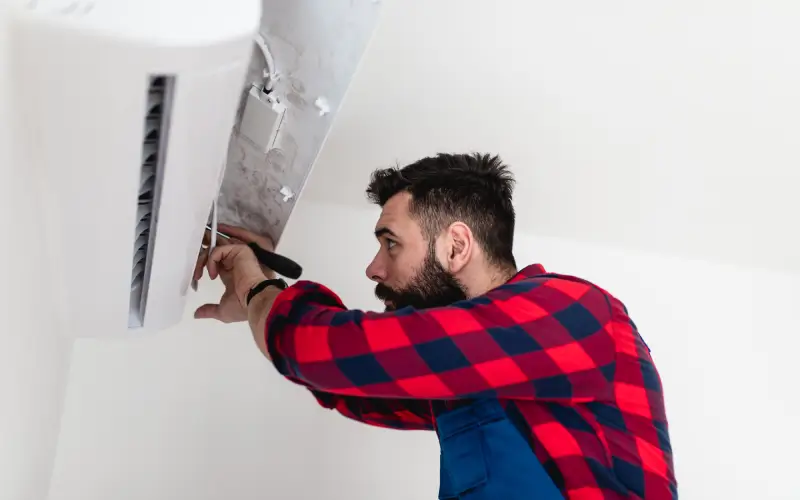How to Fix an AC Leaking Water in 5 Simple Steps

Have you noticed water dripping or pooling near your air conditioner? An AC leaking water might seem like a small problem, but it could lead to serious issues if left untreated. Many people face this situation, especially during the hot summer months. But don’t worry, this guide will explain why it happens, how to fix it, and how to prevent it from happening again.
Why Is My AC Unit Leaking Water?
Your air conditioner works by cooling warm air and removing moisture from it. This moisture turns into water, which should flow out through a special pipe called the condensate line. When something blocks the process, water can leak into your home instead of draining properly.
Here are the top reasons for an AC leaking water inside:
Clogged Condensate Drain Line
The most common cause of an AC unit leaking water is a clogged drain line. Dust, dirt, mold, or algae can build up inside the line, stopping the water from flowing out. When this happens, water backs up and leaks into your home. Experts estimate that 90% of AC leaks are caused by a drain line clogged.
To fix this, try pouring a cup of white vinegar into the line. The vinegar helps clear out mold and debris. If that doesn’t work, you may need a professional clogged drain cleaning service to remove the clog.
Dirty Air Filter
Air filters keep dust and dirt from entering your air conditioner. When they get too dirty, airflow is reduced, causing the evaporator coil to freeze. Once the ice melts, it creates extra water, which may overflow and lead to leaks.
A simple fix is to replace your air filter every 1 to 3 months, depending on usage. A clean filter improves airflow, stops freezing, and reduces the chances of your AC unit leaking water.
Cracked or Rusted Drain Pan
If your air conditioner is more than 10 years old, the drain pan might be cracked or rusted. This pan collects water from the evaporator coil, so if it’s damaged, water will leak onto the floor instead of draining properly.
The solution is simple. Replace the damaged AC drain pan. New pans are usually made of rust-proof materials to prevent future problems.
Low Refrigerant Levels
Refrigerant is the cooling fluid inside your air conditioner. When the refrigerant level is too low, the pressure inside the system drops, and the evaporator coil can freeze. When the ice melts, it can cause your AC leaking water problem.
Signs of low refrigerant include weak cooling, hissing sounds, and ice forming on the coils. Only a licensed HVAC technician can fix refrigerant leaks and refill the system safely.
Broken Condensate Pump
If your AC unit is installed in a basement or a low area, it might rely on a pump to push water out. If this pump stops working, water can’t drain and will leak instead.
A professional AC leak repair company can fix or replace the pump so your system works as it should.

How to Fix an AC Leaking Water
If water leaking from AC unit, here are some steps you can take to fix it:
Replace the Air Filter
Check your air filter. If it’s dirty, replace it right away. This will improve airflow and stop the evaporator coil from freezing.
Clean the Condensate Line
Pour one cup of white vinegar into the condensate drain line to clear any blockages. For stubborn clogs, use a wet/dry vacuum to suck out the debris.
Inspect the Drain Pan
Look under your AC unit for the drain pan. If it’s cracked or rusted, replace it with a new one.
Call a Professional
If you suspect an air conditioner leaking water, low refrigerant, or a broken pump, contact an Emergency Air Conditioning Repair Services. These problems require specialized tools and training to fix safely.
Fun Fact: Regular Maintenance Saves You Money
Did you know regular maintenance can reduce the chances of your AC leaking water by 85%. Scheduling professional AC tune up twice a year ensures your system runs smoothly and prevents costly repairs.
Air Conditioner Maintenance Checklist
Indoor Unit Maintenance
- Clean or replace air filters
- Inspect and clean evaporator coils
- Check and clean drain pan and line
- Lubricate fan motor bearings
Outdoor Unit Maintenance
- Clean condenser coils
- Inspect and clean fan blades
- Check electrical connections
- Inspect refrigerant lines for leaks
General Maintenance
- Check thermostat settings
- Test overall system performance
- Schedule professional maintenance
How to Prevent Your AC from Leaking Water
Here are some tips to stop your AC unit from leaking water in the future:
- Replace Air Filters Regularly: Check your air filter every month and replace it every 1–3 months as needed.
- Keep the Drain Line Clear: Clean the condensate line with vinegar at least twice a year.
- Schedule Maintenance: Have your AC inspected and cleaned by a professional air conditioner repair service every 6 months.
- Monitor Refrigerant Levels: Low refrigerant can lead to freezing and leaks, so ensure your system has the right amount.

Why You Shouldn’t Ignore an AC Leak
An AC leaking water may seem like a small inconvenience, but it can lead to bigger problems:
- Water Damage: Leaks can damage walls, ceilings, and floors, costing you hundreds or even thousands of dollars in repairs.
- Mold Growth: Standing water creates the perfect environment for mold, which can harm your family’s health.
- Higher Bills: A leaking AC often works harder, leading to increased energy costs.
Quick Stats About AC Leaks
- 90% of AC leaks are due to clogged condensate lines.
- A frozen evaporator coil can produce several gallons of water when it melts.
- Replacing a damaged drain pan costs around $50–$200, depending on the type of AC unit.
FAQs
Is water dripping from Window AC dangerous?
Water leaking from your air conditioner may be harmless, but it can be harmful, producing electrical dangers or water damage if not addressed immediately. If your AC is continuously dripping water inside, it could indicate a clogged drain line or other issues that require immediate attention to prevent damage and ensure proper cooling.
How much water should be in an AC drip pan?
Wondering how much water should be in an AC drip pan? A small amount is normal, but excessive water could signal a clogged drain line or other maintenance issues. Typically, there should be no more than 1-2 inches of water in the AC drip pan.
How to unclog the air conditioner drain line?
To unclog an air conditioner drain line, first clean debris with a wet/dry vacuum or a plumber’s snake, then flush the line with vinegar and water.
Where is the drain pan on the AC unit?
The drain pan on an AC unit is usually located directly beneath the evaporator coils, inside the indoor air handler, to collect and pass condensation away.
How much does it cost to fix an air conditioner?
An AC system repair cost typically ranges from $150 to $600, depending on the issue and the system type.
Searching for affordable AC repair service near me? Find reliable technicians in your area by visiting the local business directory “Discover Local Now” to quickly diagnose and fix any air conditioning issues.
Should you get HVAC serviced every year?
Yes, you should get your HVAC system serviced annually to ensure peak performance and energy efficiency.

Final Thoughts
If you notice your AC leaking water, act fast to fix the problem. Whether it’s a clogged drain line, a dirty air filter, or low refrigerant, addressing the issue early can save you time and money. Regular maintenance and a little care can keep your air conditioner running smoothly for years to come.
Still struggling with an AC unit leaking water? Don’t wait, call a professional HVAC technician today to ensure your home stays cool and comfortable!




